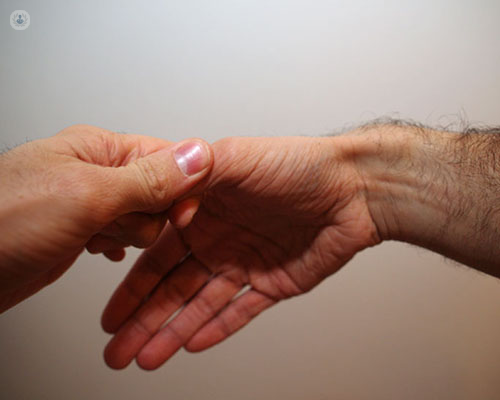

What is De Quervain syndrome?
De Quervain syndrome is an inflammation of the tendon sheath (a membrane encasing the joints in the human body) of the tendons that control thumb. This condition causes your thumb to thicken and the tendon sheath to shrink, limiting your articular motion and leading to overall pain in your hand and wrist.

What is the prognosis of De Quervain syndrome?
The outlook for this condition is good, unless you neglect it. In this case, you could suffer from trapeziometacarpal osteoarthritis, which is a type of arthritis affecting the base of the thumb.
What are the symptoms of De Quervain syndrome?
The main symptom of De Quervain syndrome is pain radiating to the wrist, forearm and thumb areas. You may also notice some swelling.
How is De Quervain syndrome diagnosed?
You will need to do the Finkelstein’s test, which can assess how much pain you are in. During this test you will be asked to close your hand in a fist, clenching your fingers above the thumb and moving your wrist towards your little finger. An ultrasound of your hand can be helpful to determine if there’s any inflammation of the tendons, which could be putting a strain on the synovial sheath.
What causes De Quervain syndrome?
The main causes for this condition can be associated with the following risk factors:
- Genetic predisposition;
- Repeated microtrauma: doing the same movements with your thumb over and over (by typing on a PC or using a mouse);
- Rheumatism;
- Structural overload
How can De Quervain syndrome be prevented?
This condition can be prevented by changing your habits and paying more attention to the onset of the inflammation.
How is De Quervain syndrome treated?
De Quervain syndrome can be treated by following some rules:
- Resting;
- Taking anti-inflammatory medication;
- Applying ice packs;
- Surgery (in case traditional therapy is not helpful in relieving the symptoms).
Which doctor should I talk to?
For an accurate diagnosis and treatment of De Quervain syndrome, you should see an orthopaedic surgeon.
